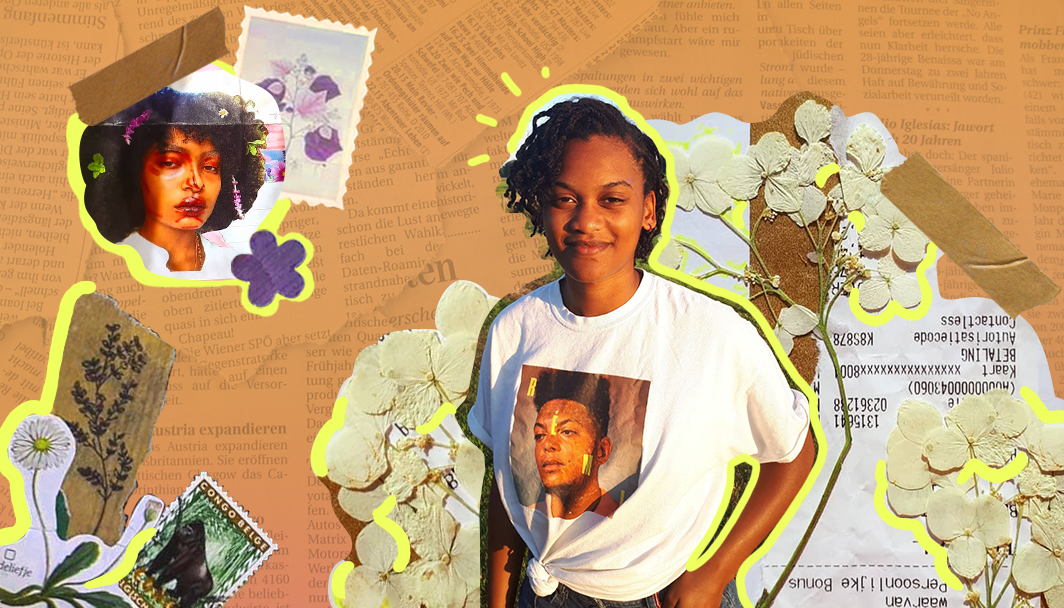“Hi, my name is Ishfarah and I am half Surinamese, half alien.”
This is how Ishfarah Esseboom starts off one of her introductory poems, at the beginning of her spoken word performances. She is a Surinamese, 19-year old student who does not know for sure what her true origins are. But there is a certain continuity in her identity. Just like she is trying to explore hidden parts of her genesis, she is also transposing this search and the complexity of her initial identity into exploring music, words and creativity in general. She does not resume to just one trend, one genre, or one current. Instead, she keeps on contouring a unique sense of self through her interests, her clothing style and her artistic work. She considers music as something that defines her, be it playing instruments, dancing or writing lyrics. She lacked the skills to actually make her own music, but she twisted that around in her own favor. “This is how I got into writing poetry. If I have the lyrics and not the music, I might as well just make it a poem.”
She was raised in Arnhem, which is where her first creative activities started to come alive. When asked to pinpoint the beginning of her artistic journey, she explained it was when she finished high school and completed a project about Dutch slang, motivated by how it has a lot of Surinamese words incorporated into it. “I wrote poems with Dutch slang and I entered a poetry contest”.
This would later become her trademark – incorporating slang vocabulary into poetry, breaking the boundaries of what is supposed to reside within a poetic work. The poetry Ishfarah writes is a welcomed breath of fresh air that breaks the cycle of serious, personal artistic works, which are predominantly highlighting heavy subjects. “I don’t like doing things that everyone else is doing, I just do whatever I like”, and it’s this feeling of authenticity that people appreciate about her art.
In Arnhem, she attended open mics and contests in order to perform her poetry. She started taking part in events and projects, such as one organized by the library in her hometown. But after she came to Rotterdam to study IBCoM, she discovered the difficulties of not having a network of people in a bigger city. “It was very hard for me to know where to go”. Eventually, she auditioned for the poetry circle of Rotterdam and she got in, so this might be her initiation into Rotterdam’s cultural life and poetry events. As she mentioned, it will always be hard to get started, but once you are in, things will start to settle down, especially if you try to keep a dose of bravery with you at all times.

In 2020, despite it being incredibly hard in many ways, Ishfarah found some ways to escape and get creative: she got into pen-palling, writing and decorating letters, baking, painting, and writing. She feels like the first lockdown was more relaxing and enjoyable for her than the one we are going through now. During the pandemic, even if the cultural life of cities has been greatly impacted, she discovered a silver lining. “I had the chance to be part of mini-performances, which I liked because it was more intimate and I talked to everyone in the room, which expanded my network.”

Another important part of her life is her studies. “I really like IBCoM and I’ve always liked learning”, but she did mention how stressful it gets at times, especially this winter, with a very busy schedule. “I feel like I haven’t had much time to write since September, but sometimes I just have to drop everything because I get in the mood and my body is telling me it’s writing time”.
In the end, she keeps herself motivated through her art and through her love of learning. She is lifting her spirit up while making sure she does not get unrealistically hopeful. The conversation with her reminds us about the power of art that is authentic through its beautiful simplicity. According to her, what makes art meaningful is creating something that is truly yours, and that you truly enjoy.
If you want to follow Ishfarah on Instagram: @ishfarah, @ishtagram.art
Author: Bianca Raicu
Editor: Gwendolyne Cheung
Illustrator: Ira Lizenko

